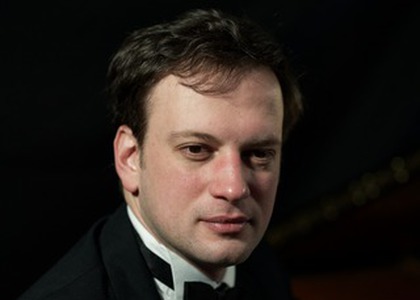> Interviews

Interview with pianist Mihai Ritivoiu
On Wednesday, June 12th, on the stage of the Radio Hall, pianist Mihai Ritivoiu performs with the Radio Chamber Orchestra, under theconductor's baton Jonathan Bloxham.We learn more about this concert, but also about the soloist's interest in conducting, from Mihai Ritivoiu.
How do you see this return to the Radio Hall stage?
I received it with great joy. It was a pleasant surprise. I was on the stage of the Radio Hall in January with the National Radio Orchestra and conductor Katharina Wincor. Glad to be back in just a few months. It just so happens that I'm back with a concerto in E flat major.
I remember it was a successful concert, the audience was very generous with their applause. How do you relate to this Concert - "Jeunehomme" by Mozart? How does he fit into your repertoire?
I have a special relationship with this concert, because I played it for the first time in a piano conducting course - sung and conducted - in Florence, and at the end of this course I played this concerto in its entirety, conducting it with an orchestraconducting it with a very good student orchestra from the Fiesole School near Florence, so I know it very well, in its entirety, including the orchestral part.It is a concert that I feel very close to, and in a way it is extraordinary, because it is the first big concert for piano, in which the role of the soloist is much more clearly defined, from the first phrases, the soloist somehow interrupts the orchestra.Sure it's not a well-known concert and maybe not with the same immediate effect on the audience when they hear his name, but it's a gem of the repertoire that I'm glad to have the chance to play.
I would like to go back a bit to the beginning of your answer, you were talking about a conducting course. I would like to know, is this an interest you have?
Yes, yes, it's an interest of mine and I did this very interesting piano conducting course taught by the pianist and conductor Ricardo Castro, who started out as a Leeds Competition winning pianist and then became the conductor of the Youth Orchestra from Brazil. This artist served me almost as a model; I want to know music from many angles.
How did attending this course informed your approach to this concert?
Of course I got to know the orchestral part in the smallest detail, willy-nilly, I conducted from the outside of course, I couldn't turn the pages while playing and it informed my understanding of the dialogue and everything happens between the piano and the orchestra and even the way I approach any concert now, because I can no longer have a passive role where I wait for the orchestra to finish a certain number of measures, but I want to know exactly what is going on.
There are musicians who have returned to this idea of being both soloists and conductors. Do you think it's a trend, a fashion, do you think it's a trend that will stay?
Maybe more than a trend, a direction to think about music, for example to think about solo concerts in a more chamber way, to collaborate in a closer way between musicians. I find pros and cons to both approaches. It gives me great pleasure to sing with an excellent conductor. It's basically the ideas of two artists happily merging if it's a good collaboration. I remember seeing this kind of concerts for the first time when I was in school I think, during the "Enescu" Festival, when Christian Zacharias was coming, there were those extraordinary midnight concerts, which apparently impressed me very much, so I wanted to try this pose as well.
Speaking of the conducting approach and the soloist approach I am reminded of a famous example with Gould, Bernstein and the Concerto no. 1 for piano and orchestra by Johannes Brahms. Do you think that such divergences are necessary for renewed approaches to the repertoire?
This example, yes, is very famous, and I think it is important in the history of musical interpretation; Gould had a very special approach. He found many problems with the actual composition of Concert no. 1 by Brahms that he wanted to solve. Whether Bernstein was happy with the result or not, or whether the audience was outraged or not, it was a historic event, and the recording remains something we can relate to in one way or another. It probably proves the fact that even from very opposite opinions, an interesting artistic result is possible. Of course, the ideal is when a harmony is reached, as is the case with chamber music. Chamber music usually doesn't work very well with too big personal egos.
In this sense, do you think the performer owes a duty to the composer?
Yes. Sure, I grew up in a tradition where there's a lot of talk about the performer's duty to represent the composer's intentions, which is only part of the coin, I would say, because first and foremost, the composer's intentions, if the composers they are no longer among us, we cannot know them exactly; secondly, those who have worked with composers in life, may know that intentions can still change, there can still be a collaboration between composers and performers, when the interpreter says "you know, it would work better this way". I don't think we should feel a huge burden not to betray the composer, but we also have our part to contribute and not all interpretations have to sound the same.
Translated by Alina Goșman,
University of Bucharest, Faculty of Foreign Languages and Literatures, MTTLC, year I
Corrected by Silvia Petrescu














